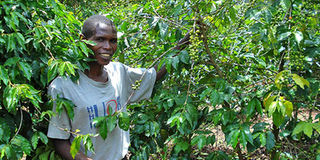Brief news on farming and agribusiness in the country

A farmer in his coffee farm. South Rift farmers have opposed the new coffee regulations, saying they will lead to a monopoly of the market and increase operational costs. FILE PHOTO | NMG
What you need to know:
- The coffee industry faces problems that cannot be fixed by regulations. The laws have not addressed fundamental issues facing us, including production and productivity, lack of extension services and access to credit.
- Banks approved by the Capital Markets Authority will be appointed by the NCE to establish and operate a direct system for settlement and payment of proceeds to growers.
- The farmers will be trained and funded while households will be supported with adaptation techniques and inputs for improved livestock.
- For more than 10 years, Mary Gichuru has been harvesting more than 300 bags of potatoes from her three-acre piece every season.
South Rift farmers say no to new coffee rules
South Rift farmers have oppose the new coffee regulations, saying they will lead to a monopoly of the market and increase operational costs.
The representatives of 17 saccos said the regulations would lead to the creation of a powerful cartel similar to the one in the tea industry.
In a statement, the farmers represented by Mr Peter Yegon, Mr Kones Koskey, Mr Daniel Koros, Mr John Chepkwony and Mr Paul Kariuki said the market should remain liberalised. They said the creation of more management levels is an unnecessary burden to farmers “who are struggling to keep the sector running”.
“The coffee industry faces problems that cannot be fixed by regulations. The laws have not addressed fundamental issues facing us, including production and productivity, lack of extension services and access to credit,” the farmers said.
The laws seek to strengthen the Nairobi Coffee Exchange.
Banks approved by the Capital Markets Authority will be appointed by the NCE to establish and operate a direct system for settlement and payment of proceeds to growers.
-Anita Chepkoech
****
N. Zealand starts Sh90m project to fund families
The government of New Zealand has launched a Sh90 million grant to help facilitate dairy farming in Makueni County.
The funding will be channeled through ChildFund Kenya, an initiative seeking to boost the livelihoods of children and young people in marginalised areas. It is also running the Agriculture Dairy Economic Development Project.
“The grant will be introduced to the community over four years to improve and develop the production of moringa, enhance dairy production and facilitate acquisition of markets for produce,” New Zealand High Commissioner to Kenya Mark Ramsden.
He added that by the end of the project, food security and incomes of the farming communities would have improved and households made more resilient to climate and economic shocks.
The farmers will be trained and funded while households will be supported with adaptation techniques and inputs for improved livestock.
Families will also be trained and empowered to generate income through agribusinesses.
-Brian Okinda
****
Losses as disease ravages potatoes
It is potato harvesting season in Mwichuiri village in Nyeri County. Farmers are huddled in groups estimating losses.
A bacterial infection has ravaged their crop.
Most of them are small scale farmers who have leased land while others till land in Mt Kenya forest under the PELIS scheme.
For more than 10 years, Mary Gichuru has been harvesting more than 300 bags of potatoes from her three-acre piece every season.
Her produce, packed in 110 to 120kg sacks is sold to Mombasa and other towns.
“We realised there was a problem five years ago but this year has been the terrible. We harvested nothing,” she said.
The potatoes are sold for Sh4,500 and Sh5,000 a sack.
“They know our potatoes are diseased so they are buying a 110kg bag at Sh1,500,” she said.
On an ordinary harvesting season, lorries ferrying potatoes jam roads. No truck is visible this year. So bad is the situation that, men employed to pack potatoes have been out of employment. A 17kg bucket goes for between Sh400 and Sh450.
Gichuru’s three-acre piece of land produced five bags of potatoes earning her a meagre Sh15,000.
-Irene Mugo
****
Don appointed to Kephis
Seeds of Gold expert contributor and Egerton University lecturer Paul Kimurto has been appointed to the board of Kenya Plant Health Inspectorate Services. Other departmental heads and board members will also serve in different parastatals.
“I think we can only make commitments on the appointments based on the professional competence of other members of the board. As a seed expert, I have always had the belief that agriculture development starts with improved seed production,” Prof Kimurto said.
“This appointment is therefore a step in the right direction.”
Dr Geoffrey Kamau will chair the Kenya Animal Genetics Resource Centre board for three years.
KAGRC will also have Dr Walter Ongeti, Dr John Gethi Muraya and Dr Bernadette Misoi as members.
Similarly, Professors Isaac Meroka Mbeche and Robert Mburu were confirmed as board members of the Kenya Veterinary Vaccines Production Institute.
-Brian Okinda





